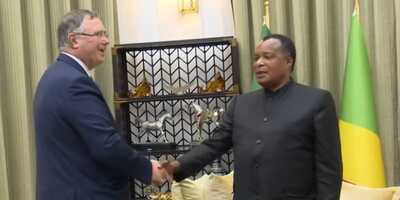 TotalEnergies CEO Patrick Pouyanné meets the dictator of the Republic of Congo, Denis Sassou Nguesso, April 2025.REDD-Monitor | 28 May 2025
TotalEnergies CEO Patrick Pouyanné meets the dictator of the Republic of Congo, Denis Sassou Nguesso, April 2025.REDD-Monitor | 28 May 2025In 2021, TotalEnergies, the French oil and gas giant, announced the Batéké Carbon Sink project in the Republic of Congo. The project covered an area of 40,000 hectares and 40 million trees were to be planted over the next 10 years. The trees were supposed to offset 10 million tons of TotalEnergies’ greenhouse gas emissions.
Now, according to an article in Reporterre by journalist Fanny Pigeaud TotalEnergies has quietly abandoned the project, with only 12.5% of the proposed trees planted.
Reporterre reports that the project “has been at a standstill for several weeks”, and “is falling apart”. The foreign staff working on the project have left the country.
When Pigeaud asked TotalEnergies about the status of the project, the company neither denied nor confirmed that it had abandoned the project. A spokesperson for TotalEnergies told Reporterre that the company and its partners, “regularly monitor the results of the plantations carried out and, based on the findings, evaluate the future direction of the project, paying particular attention to the stakeholders and communities concerned”.
The French consulting firm Forêt Ressources Management (FRM) is responsible for running the Batéké Carbon Sink (BaCaSi) project, through its subsidiary Forest Neutral Congo.
FRM told Reporterre that TotalEnergies made the decisions about the “future direction of the project”.
Evictions. No free, prior informed consent
Since the project started in the savannah area of the Batéké Plateaux it has faced serious problems. In a 2021 post on REDD-Monitor, Simon Counsell described the project as “an egregious attempt to greenwash Total’s major contribution to climate change, and conceals likely serious local ecological and social damage”.
Farmers were evicted from their land to make way for the tree plantations. An investigation by Greenpeace UK’s Unearthed and SourceMaterial found that in November 2021, white security guards arrived and started driving farmers from their fields.
Some farmers received about US$1 per hectare as compensation. Others received nothing.
No process of free, prior informed consent was carried out before the project started.
In March 2023, a landowner told CCFD-Terre Solidaire that,
Environmental and social impact study?
TotalEnergies claims to have carried out an environmental and social impact study which it submitted to the Congolese authorities. But none of the local communities and civil society organisations that have investigated the project have seen the study.
A source told Reporterre that the project should have received validation by an inter-ministerial technical commission after which it would receive a certificate of conformity. However, according to the source the project does not have the certificate.
Sources told Reporterre that TotalEnergies has stopped funding the project, without making any public announcement. In response to Reporterre’s questions, TotalEnergies’ spokesperson stated that,
Neither TotalEnergies nor Forêt Ressources Management replied to Reporterre’s question about how many people had been hired to work on the BaCaSi project.
The Acacia mangium trees planted under the project are growing too slowly for TotalEnergies. Pigeaud writes that the company “reportedly refused to allow adaptation measures to be implemented, such as the use of another tree species”.
More oil extraction
On 15 April 2025, TotalEnergies’ CEO Patrick Pouyanné met Denis Sassou-Nguesso, the Republic of Congo’s president. Sassou-Nguesso is one of the longest ruling dictators anywhere in the world. His autocratic regime has been in power for 41 of the last 46 years.
At the meeting in Sassou-Nguesso’s village and stronghold of Oyo, Pouyanné announced that TotalEnergies would invest US$500 million in new offshore oil extraction. Pouyanné is reported as saying that,












